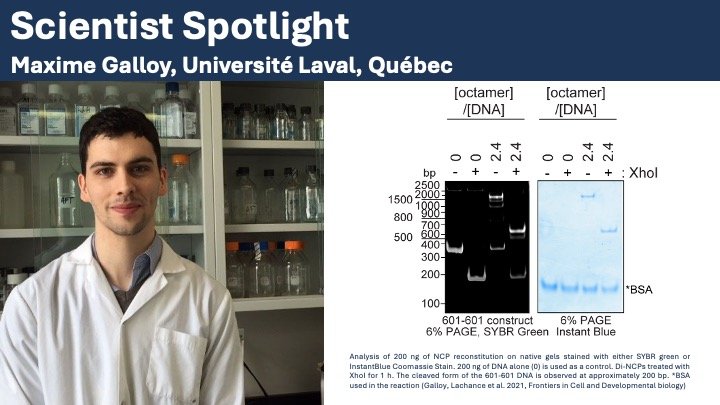Maxime Galloy is a PhD student in Amélie Fradet-Turcotte’s laboratory. The laboratory is studying the DNA damage signaling and repair pathways in different conditions including replication stress. Maxime is interested in deciphering how the chromatin composition surrounding the DNA damage impact the repair. Through biochemistry experiments and reconstitution of recombinant nucleosomes, he is determining how histone H2A variants impact the ubiquitination of the nucleosome by the E3-ubiquitin ligase RNF168 and how they affect the binding of repair factors recognizing the substrate of RNF168. He recently found that a specific histone variant, macroH2A1.2, could impact the response to replication stress in cells, mostly in common fragile sites. The laboratory is now studying how macroH2A1.2 protect the replication forks at these loci.
Can you tell us more about your research?
The ubiquitination of histone H2AK13/K15 by the E3-ligase RNF168 facilitates the recruitment of DNA repair factors at DNA double-strand breaks and stressed replication forks. This recruitment is key in ensuring timely coordination of repair across various types of DNA lesions. The histone H2A variant macroH2A1.2 (mH2A1.2) also participates in this process, selectively promoting homology-directed DNA repair, though the underlying mechanisms remain elusive. During my PhD, we uncover an unexpected function of RNF168-mediated ubiquitination of mH2A1.2 in preventing the inappropriate recruitment of RAD18 at stressed replication forks. Biochemical reconstitution experiments show that RAD18 cannot bind to nucleosomes containing ubiquitinated mH2A1.2. In cells, loss of mH2A1.2 ubiquitination leads to increased RAD18 and H2AX at stressed forks and sensitizes cells to replication stress. Depleting RAD18 or fork remodelers rescues these effects, suggesting that mH2A1.2 ubiquitination protects against harmful RAD18 engagement and subsequent fork reversal at stressed forks. Our findings underscore the negative impact of activating improper DNA damage tolerance pathways at these loci.
Where are you from? What do you miss about your hometown/country?
I am from Belgium, where I miss mostly my family, and I should recognize I also miss the chocolate.
What city do you currently live in and what do you like most about this city?
I currently live in Québec City, the perfect place to feel included whatever our culture.
What are some ways you detach from work/science/academia? Do you have a favourite example of this?
Outside of the lab, I love playing sports (basketball, volleyball or pickleball). I am also a reader of fantasy and historical fiction.
Do you have any special talents outside of research that few people in your academic life know about?
I love baking, and I often use my family and friends as taste testers for the many recipes I want to try. I love how baking needs precision as much as biochemical research.
Do you have a recommendation for a book, tv show, movie or documentary?
I highly recommend the Pulitzer Prize-winning novel All the Light We Cannot See by Anthony Doerr. As a student in biology, I’d also suggest the movie The Immortal Life of Henrietta Lacks, based on Rebecca Skloot’s book of the same name.
What made you decide to become a researcher?
Early in my education, I witnessed so many children having untreatable cancers and I knew immediately I wanted to become a researcher and help find cures for cancer. I also knew this would be a perfect match for my curiosity and eagerness to learn.
If you wouldn’t be a researcher, what would you like to be/think you would be?
I think I would have pursued a career as a baker; the precision and creativity in this work have always fascinated me.
What sparked your interest in epigenetics?
As Dr. David Allis said, “Every amino acid in the histones counts,” and this rings so true that it makes epigenetics feel almost magical. It’s fascinating how these tiny differences can have such different roles in biological functions.
If you could give your “first-year-PhD-self” one advice, what would it be?
I know you like running but remember that every research project requires time and thoughtful reflection. Taking breaks often helps you return with renewed energy and maintaining both your physical and mental health is essential.
Where would you like to see your research/field of interest end up in the future?
Dr. Mathieu Lupien says “Cancer is an epigenetic disease,” and I would love to see our understanding of epigenetics becoming as advanced as our knowledge of DNA.

